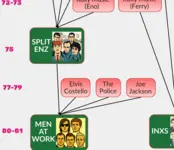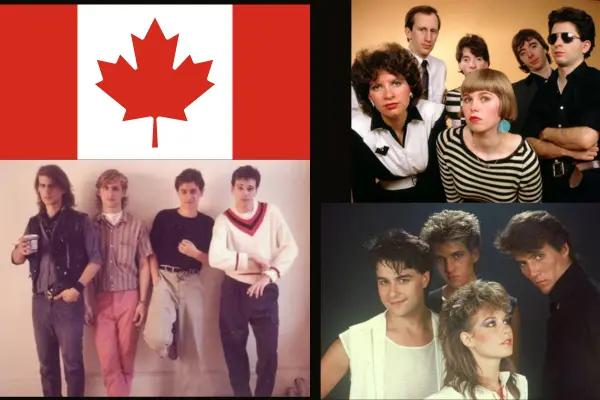Intro
While Canadian new wave had fewer stars than in Australia or New Zealand, they still set the bar high for new wave's trademark aungular guitars, icy synths, and sly social commentary. Toronto and Montreal in particular birthed bands that could hold their own against their UK and US peers. Martha and the Muffins, Spoons, and Men Without Hats each carved out a distinct niche, leaving a lasting mark on the global new wave sound.
Explore the Synth & Swagger Members' Editions
Adam Ant vs the Media, Canadian New Wave, Female Empowerment in New Wave
And a new enhanced article every month

Martha and the Muffins
The band that would become Martha and the Muffins chose that name in 1977 to distance themselves from the anarchistic, vicious and rotten perception of punk. And while they don’t have that aggression, Martha and the Muffins still had new wave edge and drew you in with lyrical deft (and a saxophone that dodged the cheesy sax solo trope of the ‘80s). They emerged from Toronto’s Queen Street West art-rock scene (Canada’s answer to CBGB of Talking Heads and others' fame).
Echo Beach
By far Toronto new wavers Martha and the Muffins are known for their cult hit Echo Beach. It’s an ode to a rustic getaway a few hours from Toronto. Martha has a monotonous office job in Toronto, but she’s working for the weekend (sorry!) at Echo Beach to watch the beautiful sunsets. It’s straightforward, but Martha’s post-punkish vocal delivery and the tight, angular guitar work of Mark Gane are what make the song. Also, Andy Haas infuses his saxophone to add timely emphasis to the melody. While the States mostly missed it, Echo Beach was a top-10 hit in Canada, the UK and Australia.
Black Stations/White Stations
In 1984, Martha and the Muffins had a poignant political track in the album opener (Mystery Walk) in Black Stations/White Stations. As the name indicates, it calls out the music industry for separating black and white music. Two years earlier, Billboard headscratchingly changed their Hot Soul Singles chart to Hot Black Singles (in 1990 the race reference was once again removed). But it illustrated the segregation of radio stations. In the chorus, Martha implores the radio stations to “break down the doors” as it’s 1984. Leading with Black Stations/White Stations emphasized the band’s stance against this. Musically, it reminds me of a mellower Oingo BoingoOingo Boingo. And I thought of the B-52s' song Good Stuff, though that came later. It was prominent in US dance clubs, almost topping the dance charts there.


Spoons
While Spoons and Martha and the Muffins have similarities (post-punk elements like half-shouting vocals and angular guitars, Spoons have enough quirks to foster a different sound from their more popular cousin. While Martha’s sound harkens to arty new wave like Talking Heads, Spoons is a bit dancier and synth-friendly, like early New Order or OMD. They had five top-40 Canadian hits, including three on 1982’s Arias & Symphionies. And they were a MuchMusic staple there.
Nova Heart
Nova Heart is Arias’ lead single and also a good representative of their early sound. The intro sets the template for the song with a brooding guitar grafted on a quick, dancy synth. It sounds ahead of its time: this could pass for a Bravery track! Despite the danceability, the lyrics are deep: Gordon Deppe laments the devaluing of the creative class, using architects, authors and artists as examples (“you’ve served us well until now”). This resonated well with listeners as there were plenty of complaints about monoculture in the ‘80s (and the ‘00s and now). But Deppe offers some hope by saying that we can enjoy the architectural treasures and books that do exist. Indeed, humanity will never lose its creative spirit, like the heart of a nova that doesn’t burn out.
Romantic Traffic
Two years later Spoons released the catchy Romantic Traffic. As with many other new wave bands, Spoons added some conventional pop structure and gloss to their songs. For example, the do-do-do-dos that recall Duran Duran. Turns out Romantic Traffic shared a producer with Duran Duran in the busy Nile Rodgers! But I was also hooked by the clever wordplay. Romantic Traffic employs three clever car-related metaphors for romantic entanglements: losing another car in a caravan (the guy who got away), getting rear-ended by changing lanes too slow (love triangles), and the sudden changing of traffic lights (being blindsided by a breakup or fading love). It’s still a radio staple in Canada, and for good reason.


Men Without Hats
Let’s switch provinces to Quebec, home of synthpoppers Men Without Hats (in Montreal? Gutsy!). In their early albums, the band consisted of the classically-trained brothers Doroschuk (vocalist Ivan, Stefan (bass) and Colin (lead guitar). They scored a big worldwide hit with an ode to inclusivity: Safety Dance. And they are the most-known Canadian new wave band in the States. They are known for smooth but danceable synths and Doroschuk’s commanding vocals. But they showed more range later in the ‘80s and always had clever, skeptical lyrics. They still tour in the form of Ivan and a backing band (I saw them in 2012 and Ivan is intentionally and hilariously corny with his dancing and miming).
I Got the Message
Two singles after the huge Safety Dance came I Got the Message. The intro features a rich synth bassline that forms the song’s backbone. The intro and choruses are mostly bouncy, fast-paced female vocals which are a great hook, and Ivan’s baritone provides a great counterpoint. This approach was also employed in later songs. In a nod to his Quebec upbringing, Ivan places a few French lines (“Et oui je ne comprends pas“) which at first I didn’t understand. The sugary bounce of Message belies the topic: a questioning of the meaning of life like the Talking Heads’ Once in a Lifetime. The biggest takedown of the song has Doroschuk saying “settle down and get a dog and a wife” and the immediately undercutting that concept by ordering you to “get down on all fours”.
Pop Goes the World
After their sophomore album Folk of the ‘80s (Part III), Men Without Hats went in a different direction with Pop Goes the World, favoring slower songs and incorporating more social commentary. The title track is a perfect example of both, and it works! Previously, Men Without Hats’ synths were prominent throughout their songs. In Pop, they are emphasized via solos in between verses and the bridge. And the previously-booming Ivan Doroschuk restrains his vocals. Lyrically it pokes fun at the popping (commodification) of the world. Pop Goes the World is actually the best-charting of their songs in Canada and was inducted into their Songwriter’s Hall of Fame. While danceability is played down (they already made their wedding reception staple in Safety Dance), it did nick the US Dance charts.


Outro
Canadian new wave may not have produced household names on the scale of Duran Duran or INXS, but its bands packed just as much invention and wit. Martha and the Muffins gave voice to both weekend escapes and industry critiques, Spoons balanced art-school edge with radio polish, and Men Without Hats turned existential questions into dance hits. Together, they proved Canada could make new wave every bit as sharp, sly, and unforgettable.
Adam Ant vs the Media, Canadian New Wave, Female Empowerment in New Wave
And a new enhanced article every month









